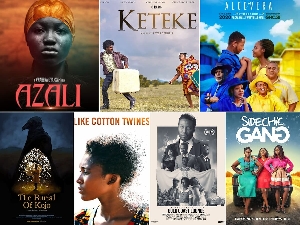 Patronage of local movies have seen a decline in recent years
Patronage of local movies have seen a decline in recent years
Take a moment to reminisce about the periods when Ghanaian movies were the talk of town.
Remember the days of ‘A Stab in the Dark’, ‘Okukuseku’, ‘That Day’, ‘Matters of the Heart’, ‘Asoreba’, ‘Who Killed Nancy’, ‘Babina’, ‘Diabolo’, ‘The Game’, ‘4 Play’, ‘Who Loves Me’, ‘Girls’ Connection’, ‘ The Heart of Men’?.
Remember the days of ‘Yvonne Nelson’, ‘Yvonne Okoro’, ‘Jackie Appiah’, ‘John Dumelo’, ‘Majid Michel’, ‘Van Vicker’, ‘Nadia Buari’ among others?
Now think back to the last good Ghanaian movie you watched...
Ghanaian cinema has a long and diverse history, from the colonial films of the 1920s that aimed to educate and influence the local population, to the nationalistic films of the 1950s and 1960s that reflected the identity and culture of Ghana under Nkrumah's leadership.
The industry entered a new era in the 1980s with the emergence of the video film industry, which enabled independent filmmakers to produce low-cost and popular films for the Ghanaian audience.
One of the pioneers of this era was Kwaw Ansah, who made the first independent film, Love Brewed in the African Pot, in 1981.
Since then, the industry has produced many films that explore various social and cultural issues, as well as attract international attention and collaboration.
It is said that the “Golden Age” of Ghanaian movies, the 2000s and early 2010 was marked by many notable movies and TV shows as well as notable actors that we know and still love today.
So what happened?
GhanaWeb Entertainment’s Isaac Dadzie sat down with Michael Kwaku Ola, an independent filmmaker, events producer, and on-air personality to find out what caused the decline.
“We were slow to migrate to digital formats,” he said. “We actually were on the verge of migrating from VCD to DVD but most of the producers felt DVD was not really involved, that people really could not play their movies from DVD and all that.”
Many producers rejected the idea of transitioning to DVDs which could take in more content than VCDs. Instead, they resorted to breaking down their movies into ‘parts’ and releasing them on multiple VCDs to sell separately.
This did not go down well with audiences. “that was the beginning of the downfall, because the consumers who watch the movie are like ‘it's so short’. They felt like maybe we were ripping them off. So people lost interest, people lost confidence in the movies,” Ola Michael continued.
When producers finally decided to digitize, it was a little too late; production costs and equipment costs were high.
“We didn't have the money," said Ola. "We didn't have the financial strength to invest heavily in those areas. For example, we didn't have money to invest in platforms. We're relying on government to do it.”
Fast-forward to now and the same problems still exist, albeit worse, funding, equipment and structures are non-existent.
Investors know that, and they are smartly pulling back.
According to Ola, “We don't have the money to shoot anymore. We don't have the places to show the films anymore. And so if I have some financial capital somewhere that I want to shoot a movie, I look at these factors. How am I going to get my money back?”
So what's the way forward?
Cinemas, showrooms, mobile cinemas, movie houses (the proper ones, not what you’re thinking), makeshift
“We need to build those structures, to have those structures in place. We cannot go back to the days when we used to sell CDs on the market.
“What we have is the cinema and the streaming platforms. But for us, cinema seems to be the best option available now. But we don't have a lot of that. And when it delays the cinema culture, too, dies with the people.” Ola Michael says.
More cinemas need to come up, tickets need to be cheaper, and people need to have a feel of the addictive cinema experience.
“Even when you get the money, when you get the structures in place, the people still need time to warm up into the cinema culture again, which takes a lot of time.”
Maybe the movie industry in Ghana is not as dead as initially thought, but it definitely will need a lot of rebuilding. Talent and creativity are available, but intentionality from stakeholders is needed.
Maybe, with time, we may get another golden age.
ID/BB
Click here to follow the GhanaWeb Entertainment WhatsApp channel
Ghana’s leading digital news platform, GhanaWeb, in conjunction with the Korle-Bu Teaching Hospital, is embarking on an aggressive campaign which is geared towards ensuring that parliament passes comprehensive legislation to guide organ harvesting, organ donation, and organ transplantation in the country.